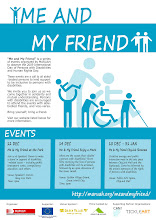This was a speech in Parliament on 11 March 2010 by NCMP, Sylvia Lim,during the Committee of Supply debate, on the budget for the Ministry of Transport.
—————-
Disabled persons face challenges fitting into society for work, recreation and social interaction. Travel is a necessary step towards integration, to work, to socialise and to be consumers.There are currently no public transport concessions for the disabled.The disabled here have low earning capacity. Many do not work; those who do, earn a few hundred dollars per month, spending up to a third on travel expenses.The government has often said that we should build an inclusive society. It therefore should not take a back seat on this issue.Other governments are proactive. In the UK, disabled persons qualify for a special “Railcard” which entitles them to travel throughout the UK at one-third off from the normal fare. In addition, disabled persons in London can travel off-peak for free on buses, the Underground and trains.The government cannot wash its hands off the matter by saying that the public transport system is operated commercially and it is up to the public transport operators (PTOs) to decide. The disabled have no bargaining power against the big companies.For instance, the Land Transport Authority, as regulator, can make it a licensing condition that the PTOs recognize disabled passengers for concession travel.According to a 2001 MOH survey, less than 2 per cent of Singaporean adults below 60 have some sort of disability. Is the number of disabled too much for the PTOs? The PTO’s operations are reaping profits of tens of millions of dollars annually and this is part of their corporate social responsibility.
Disabled persons face challenges fitting into society for work, recreation and social interaction. Travel is a necessary step towards integration, to work, to socialise and to be consumers.
There are currently no public transport concessions for the disabled.
The disabled here have low earning capacity. Many do not work; those who do, earn a few hundred dollars per month, spending up to a third on travel expenses.
The government has often said that we should build an inclusive society. It therefore should not take a back seat on this issue.
Other governments are proactive. In the UK, disabled persons qualify for a special “Railcard” which entitles them to travel throughout the UK at one-third off from the normal fare. In addition, disabled persons in London can travel off-peak for free on buses, the Underground and trains.
The government cannot wash its hands off the matter by saying that the public transport system is operated commercially and it is up to the public transport operators (PTOs) to decide. The disabled have no bargaining power against the big companies.
For instance, the Land Transport Authority, as regulator, can make it a licensing condition that the PTOs recognize disabled passengers for concession travel.
According to a 2001 MOH survey, less than 2 per cent of Singaporean adults below 60 have some sort of disability. Is the number of disabled too much for the PTOs? The PTO’s operations are reaping profits of tens of millions of dollars annually and this is part of their corporate social responsibility.
———–
Transport Minister Raymond Lim’s reply:
“I’d be very slow in stipulating (to operators) how best to run the concession policy.”
Parliamentary Secretary (Transport) Teo Ser Luck:
Mr Teo reiterated the Government’s non-intervention stand; it will “strongly encourage” public transport operators to consider requests from the disabled and elderly. Help is available to the needy through schemes such as Workfare and ComCare, said Mr Teo.
Source: Gerald Giam
Subscribe to:
Post Comments (Atom)



No comments:
Post a Comment